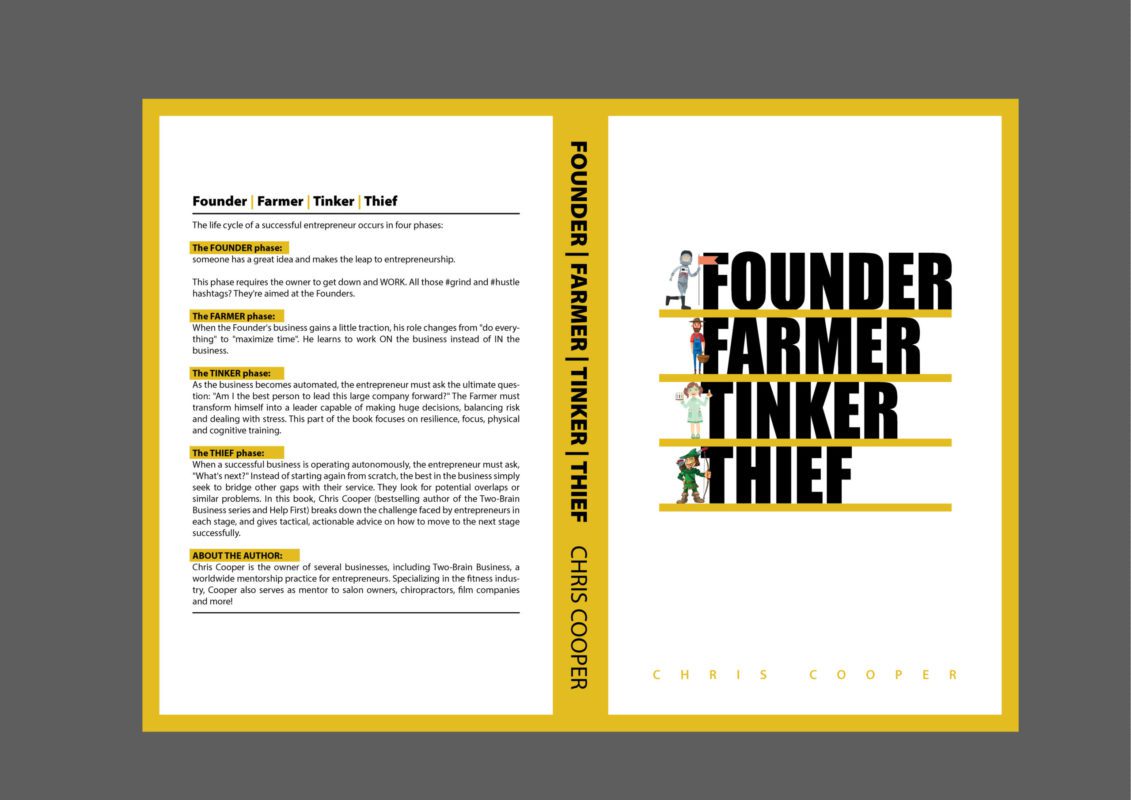From the book, “Founder, Farmer, Tinker, Thief” by Chris Cooper
I’ve been a mentor for years. We currently have over 420 entrepreneurs in the TwoBrain family; over 2,000 have done a free call with me in person; and 20,000 purchased my first book, Two-Brain Business.
Every single entrepreneur needs a 1:1 mentor, because no two businesses are identical. But entrepreneurs generally fall into four broad categories: Founder, Farmer, Tinker and Thief. We call these the Four Phases of Entrepreneurship.
Which phase are you in? You can take the test here: www.twobrain.com/test
Your phase isn’t determined by longevity. It’s determined by your profitability; your systems; your team; and your growth as a leader. Founders need different marketing strategies, branding and income than Farmers do. And Tinkers have completely different challenges.
Every entrepreneur needs a mentor. And that mentor should offer education, advice and inspiration that’s specific to the entrepreneur’s needs RIGHT NOW.
In the Founder phase, the entrepreneur leaps off the cliff with his big idea. His goal is simple: to survive. He opens his business. He buys his equipment and supplies. He signs the lease, the loan, and the letter of intent. He flips the open sign on the door. Then what? The Founder’s big idea might leverage a better life, but his labor is the fulcrum. And that’s understood by the Founder, who embraces the romantic ideal of the entrepreneur: poring over the books at midnight, a trace smear of flour or gym chalk on his tired face, pondering the next step up the ladder to success. #hustle #grind
The Founder phase takes a heavy toll — physically exhausting, financially terrifying, and the largest strain on every personal relationship the Founder has. My job as mentor is to get the Founder out of the Founder phase as quickly as possible. Many businesses never survive this phase.
The Farmer phase starts when the entrepreneur begins the shift from self-employed to business owner. He has hired his first employee, even if it’s a low-level role. He’s begun paying himself a little. But he’s probably still the face of the company. He’s probably still opening the doors at 5 AM, then answering emails and making sales calls “when he can.” He’s still working in the business instead of working on the business. He’s busy being busy. In the Farmer phase, the entrepreneur is susceptible to martyrdom. “No one can do it like I can!” he thinks, whether about sweeping the floors or training the clients. And he’s right: no one else would do it that cheaply, that tired, or at the expense of their kids’ baseball games. No one else would work for a boss so demanding, so cheap, so ruthless. But in buying himself a job, the Farmer is beholden to his own self-worth.
My role as mentor to the Farmer is to replace him in low-value roles, and fill his time with high-value roles. It’s to systemize his batter-mixing, replace him at the front counter, and teach him to grow his reach. Eventually, it’s to get him home by dinnertime. The Farmer phase is where 90% of entrepreneurs spend the entirety of their careers. They call themselves “owner-operators,” and most will never even retire from their business, let alone become wealthy or create meaningful careers for others. But some do. These are the Tinkers.
A Tinker has built a business that runs itself. Now she’s trying to build another, or to duplicate her first success, or to take her first idea to a new market, or to start over with a new idea. If she’s not given new challenges, the Tinker will probably stick her hands in the machine, constantly “tweaking” her original business until it’s broken. Some of the Tinkers in TwoBrain are turning their businesses into franchises, developing online projects, partnering with other owners, and starting second companies. Others are setting up their retirement plans and buying buildings to create cash flow assets.
My role as mentor to Tinkers is to help them identify the next big project, and then keep them focused on it. I’ve never met a Tinker who didn’t have at least three big projects in mind. Free from their original business—and still making passive income from it—the Tinker’s greatest risk is killing the golden goose.
The Tinker’s attention must shift from developing their first business to developing themselves as a leader. That means a plan for physical activity, mental acuity, and mental training. It means peer support: “It’s lonely at the top” describes the Tinker to a capital T. It means mentorship from someone who has successfully navigated the “valley of death” created by hiring a management layer for the first time. If they can, they become a Thief.
A Thief moves resources from an area of high concentration to an area of low concentration. Think Robin Hood, not the Hamburglar. With new resources, the Thief seeks to build a legacy business, providing multi-generational wealth or service to his community. Many Thieves become mentors. Others create bursaries or endowments, or found charities. Some continue to build, forging partnerships and taking their expertise to new markets. My role as mentor to the Thief is to inspire, educate, and ask “Who did you serve this week?”
Over the next few weeks, I’ll share stories, case studies, and even some “armchair mentor” scenarios from the book. I’ll also send you some SPECIFIC tools, strategies and advice for YOUR phase after you take the test on the TwoBrain.com site:
Take the test here: www.twobrain.com/test
My favorite response to the test so far: “I didn’t score where I wanted, but I know exactly what to do to get to the next phase now! I’m booking my mentor call TODAY!”

